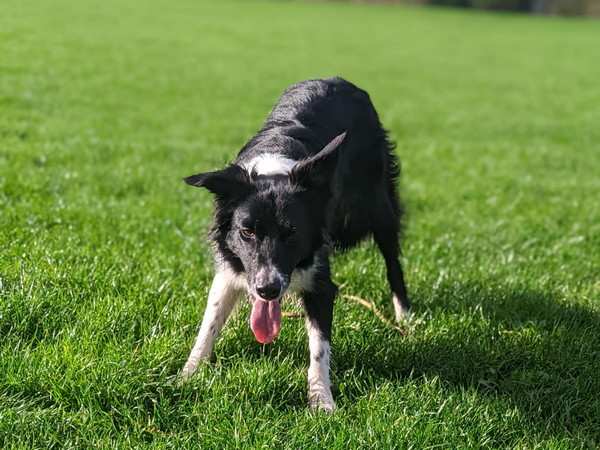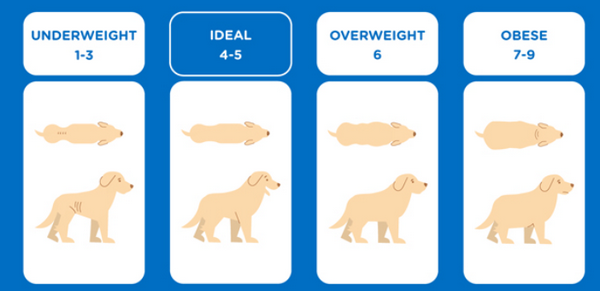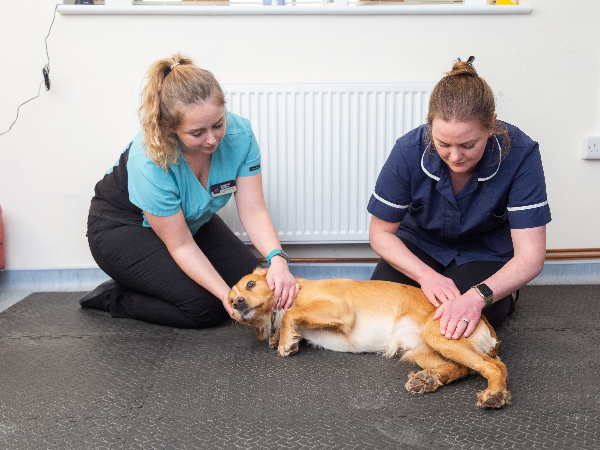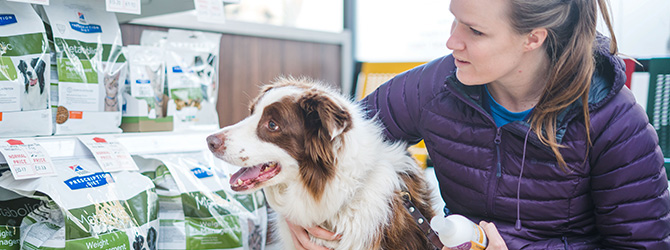Best diet for dogs - Importance of a balanced diet for dogs
A great way to keep your dog healthy and happy is to provide them with a well-balanced diet. But with so many options available, it can be overwhelming figuring out what's best for them. Luckily, there are some simple things that can help you make your choice.
Brief summary
- Choose a high-quality food that is appropriate for your dog's age and breed. Puppies and senior dogs have different nutritional needs than adult dogs.
- Look for a food that is high in protein and low in carbohydrates. Dogs are carnivores, so their diet should be high in meat and other animal-based ingredients.
- Avoid foods that contain artificial ingredients, fillers, and preservatives. These ingredients can be harmful to your dog's health.
- Make sure your dog has access to fresh, clean water at all times.
What affects your dog’s diet?
Every dog is different, and there are lots of things that can influence what your dog should eat.
Your dog’s age
Not all dog food is designed for all dogs. A dog’s nutritional requirements will vary as they progress from puppies to adulthood and then become more senior. Most dog foods are divided into different groups, with special recipes created to match your dog's nutritional needs as they grow older. This is often called the 'life stage' and can be found on the packaging of your dog's food and online.
Puppy
Puppies have lots of energy and are growing rapidly. That's why they need more calories to keep them going all day and to help with their quick growth and development. Their diet needs more protein and important nutrients like calcium and phosphorus to support bone growth.
Puppy diets are made to help with this fast growth phase without making them overweight or causing bone issues, especially if they're a big breed. That’s why it’s best to feed them food meant for their age and size. You'll often find a guide on puppy food that tells you if it's for small, medium, or large breeds.
Adult
When your dog becomes an adult, they need a diet that can help them stay at a healthy weight and in good shape. Balanced diets for adult dogs include protein, carbs, fats, vitamins, and minerals. These give them enough energy for their activity level but not so much that they put on too much weight. Adult dog food doesn't have as many calories as puppy food, and has different nutrients to support maintenance instead of growth.
Remember, adult dog diets also consider their size. So, it's important to give your dog the right food for their breed size.
Senior
As your dog ages, they become less active because their metabolism slows down. This means they need fewer calories to avoid gaining weight, but need more readily digestible nutrients to stay healthy and happy.
Some older dogs might need more fibre to help with digestion, while others could need different protein and other nutrients due to health conditions like kidney disease or arthritis. Senior dog diets are made to meet these needs and keep them healthy overall.
Dog breed
Different breeds have different needs. For example, large-breed puppies need a careful ratio of nutrients to help their bones and joints develop, while working dogs might need food that's packed with calories because they burn energy so quickly.
Your dog's health
If your dog isn't feeling well, they might need a different diet. For instance, if they've got kidney problems, a food that's low in phosphorus and protein could help. And if your dog has allergies, they might need special hypoallergenic food. Your vet can give you advice about what's best for your dog's health.
Your dog’s activity level
Dogs that run around a lot, like Border collies, spaniels, and retrievers, need more calories, protein, and certain nutrients. But if your dog isn't that active or tends to gain weight, they'll need food with fewer calories and higher fibre to stay a healthy size whilst keeping full.

Quality of ingredients
When you're picking dog food, make sure the first ingredient is an animal protein source like chicken, beef, or fish. It's even better if that protein makes up at least half of the food. Good ingredients are easier for your dog to digest and give them more of the good stuff they need.
Understanding your dog’s nutritional needs
Your dog needs lots of different nutrients to stay healthy and happy. Let's break down what those nutrients are.
Proteins
Proteins are essential for a dog's growth, tissue repair, and overall well being. These proteins are composed of amino acids. While dogs can produce some amino acids on their own, there are 10 essential amino acids they must obtain from their diet. Animal-based foods like meat, fish, and eggs are rich sources of these vital amino acids.
Carbohydrates
Carbohydrates come in two types: simple carbs (sugars) and complex carbs (fibre and starch). Dogs don't need a high proportion of carbohydrate in their diet, but they're a useful source of energy. Plus, they often come with fibre that's good for digestion. Carbs can be found in whole grains, veggies, and things like peas and beans.
Fats
Fats are like super fuel. Fats are also needed to build cells and absorb important nutrients. They also contain essential fatty acids, required for many bodily functions including brain health and the immune system. Your dog can't make certain fatty acids on their own, so they've got to get them from food sources like fish oil and flaxseed.
Vitamins
Vitamins do lots of important things, like helping with energy, making blood clots, and keeping bones strong. There are fat-soluble vitamins (A, D, E, and K) and water-soluble vitamins (B-complex and C) that your dog needs. Most vitamins come from a balanced diet, but sometimes extra vitamins are needed during certain ages or health conditions.
Minerals
Minerals are needed for strong bones, keeping nerves and muscles healthy, and other important stuff. Calcium, phosphorus, and other minerals are key. Usually, a balanced diet gives enough minerals, but sometimes extra might be needed for specific situations.
Remember, giving the right amount of these nutrients is crucial. Too much or too little of some things can cause problems for your dog's health.
Do dogs have to eat meat?
Your dog is an omnivore, which means they can eat both plants and meat. Historically, meat has been a big part of their diet since before they became pets thousands of years ago. Some nutrients, such as the amino acid taurine, is found in meat products but not in plant material.
Dogs can do well on a range of types of diets, as long as they have been formulated to contain the correct balance of nutrients.
Wet vs dry food. What's best for your dog?
Picking between wet food and dry kibble can be tricky. It depends on a number of things, including your dog’s preferences, your storage options, your budget, whether your dog likes to graze, and their general health..
Wet Dog Food
| Pros | Cons |
|---|---|
| Wet dog food is high in moisture, keeping your dog hydrated. This is especially useful for dogs that don't drink enough water. | Once opened, wet dog food must be used within a couple of days and put in the fridge. |
| Many dogs find wet food more palatable than dry food. The smell and texture can be more appealing, making it a great option for picky eaters. | Wet dog food is typically more expensive than dry food. |
| Wet food is softer and easier to chew, making it a good option for puppies, seniors, or any dog with dental issues. | Wet food doesn't provide the same mechanical cleaning action on the teeth as dry food, which can contribute to plaque buildup. |
Kibble
| Pros | Cons |
|---|---|
| Dry dog food is easy to store and has a long shelf life. It can be left out without spoiling. | Dry food has a low moisture content, so dogs eating only dry food need more water. |
| The texture of dry food can help keep a dog's teeth clean by reducing plaque buildup. | Some dogs may find dry food less appetising than wet food. |
| Dry dog food is typically less expensive than wet food and more cost-effective for feeding large dogs. | Dry food can be difficult for some dogs, especially those with dental problems or older dogs. |
What should I look for in dog food?
To figure out the best food for your dog might be a case of trial and error. But there are some things you can do to make it easier.
Knowing what to look for on the label
Dog food labels can be confusing, but they've got loads of important information that will help you make the healthiest choice for your dog. Look out for:
Company name
Good dog food companies make it simple to get in touch with them. Look for easy-to-find email addresses, phone numbers, and their address. This shows they care about helping you if you have any questions or worries about their food.
Complete or complementary?
Some foods are 'complementary,' which means they're not the full meal. For all the nutrients your dog needs, choose a 'complete' dog food.
Ingredient list
Dog food ingredients are listed on the packaging by weight, so whatever comes first in the list will be the main basis of the food. Find a high-quality protein source like chicken, beef, or fish as the top ingredient. Also, watch out for sneaky tricks like listing grains in different parts to make them seem less important.
Guaranteed analysis
This part shows the minimum or maximum amounts of nutrients in the food, like protein, fat, fibre, and moisture.
Nutritional adequacy statement
This bit says if the food gives all the right nutrition and which life stage (puppy, adult, senior) it's for.
Understanding its key ingredients and nutrients
High-quality protein
Get food with named animal protein like chicken or fish high on the list. Dogs need protein to grow and stay healthy.
Healthy fats
Fats give energy and help with vitamins. Look for fats like chicken fat or salmon oil, which have important fatty acids.
Complex Carbohydrates
Carbs give energy and fibre. Whole grains like brown rice or grain-free stuff like sweet potatoes are good.
Vitamins and minerals
Veggies, fruits, and extra supplements add vitamins and minerals your dog needs.
Knowing what to avoid
Unnamed mean or meat meal
Stay away from foods that just say "meat" or "meat meal." It's better when they're specific what meat it is.
Artificial additives
Things like colours, flavours, and preservatives aren't needed and can cause issues for some dogs.
Fillers
Ingredients like corn and wheat gluten might fill up the food, but they don't do much for your dog's nutrition.
Feeding guidelines for dogs
Feeding your dog right is crucial for their health. Obesity is a rising concern in pet dogs, so portion control is as important as what they're eating.
How much should you feed your dog?
How much your dog eats depends on a few things: age, size, breed, how active they are, and whether they're healthy.
Puppies
Puppies need small, frequent meals, to provide a constant source of energy for their activity levels, play and growth. Chat with your vet to make sure your pup's getting the right food for their age and type.
Adult dogs
How much an adult dog eats depends on size and activity. Small dogs might only need half to one cup of dry food daily, while big dogs could need more than four cups. Active dogs need more calories than couch potatoes. Use the packet guidelines as a baseline for what your dog may need, or chat with your vet.
Senior dogs
Older dogs might move more slowly and need fewer calories to avoid gaining weight. But they still need good nutrition to stay healthy as they get older. Some older dogs benefit from a diet which has a high level of digestibility, to ensure they are getting the nutrition they need.
Most dog food bags have guidelines, but these aren't set in stone. Keep an eye on your dog's weight, adjust food if needed, and ask a vet if you're unsure.
How often should you feed your dog?
Puppies
For puppies, it's best to give them three or four small meals throughout the day. As they age, you can cut down to feeding them two times a day.
Feeding them by hand is a great way to know how much they're eating but also to bond with them and ensure they learn to take food gently.
Adult dogs
Most adult dogs do well with just one or two meals every day.
Senior dogs
Older dogs might do better with two smaller meals a day to help with digestion.
Remember, every dog is different, so it's a good idea to talk to your vet about what's best for your dog.
Can diet help with health conditions?
Feeding the correct diet can help some health problems in dogs, like obesity, diabetes, and heart issues.
Obesity
Obesity in dogs is on the rise. This puts them at risk of diabetes or heart trouble and can also impact their joints. A diet low in calories but high in fibre can help them lose weight without getting hungry.

Diabetes
Dogs with diabetes need a regular feeding schedule to help manage their blood sugar. They usually require a food high in fibre and low in carbohydrate.
Kidney disease
Dogs with kidney problems may need a diet low in protein, phosphorus, and sodium, to try and slow disease progression.
Allergies
Some dogs are allergic to certain foods. This can give them skin troubles or upset stomachs. A special diet, guided by a vet, can help figure out the issue and manage ongoing symptoms.
Gut problems
Dogs with digestive issues might need easy-to-digest food that's lower in fat.
Joint health
Dogs with joint problems can benefit from a diet high in omega-3 fats. Some foods even have added supplements such as glucosamine to help their joints.

Should I change my dog’s diet as they age?
Dogs have varying needs as they progress through different life stages. Their dietary and health requirements may also change due to medical conditions or as a natural part of ageing.
How to change your dog’s diet
If you need to switch your dog's food, don't do it all at once. Start by swapping about 25% of their old food with the new one. Do this for a few days. If they're feeling good and their tummy is okay, move to 50% new food and 50% old food. After a bit, increase the new food to 75% while keeping 25% old food. Finally, over a week or two, shift completely to the new food.
Every dog is different, so if you're unsure, ask your vet. They know what's best for your four-legged pal.
Do different breeds have different needs?
Yes, breed can indeed influence a dog's nutritional needs. Different breeds have different sizes, body types, energy levels, and predispositions to certain health conditions, which can affect their dietary requirements.
Dog food myths
There are some stories about dog food that aren't really true. Let's set the record straight:
Myth: Dogs should only eat meat
Even though dogs mainly eat meat, they are omnivores and so can eat other things as well. Their diets are usually a mix of good animal proteins, grains, fruits, veggies, and fats.
Myth: Grain-free diets are always better
Grain-free is good if your dog needs it, but most dogs aren't allergic to grains. They can eat things like rice and oats with no health issues. Recent studies have queried a link between grain-free diets and heart disease.
Myth: Dogs shouldn’t eat by-products
By-products are parts of animals people don't usually eat, like liver or lungs. However, some are really healthy, like the liver, kidneys and heart.
Myth: High protein diets are bad for kidneys
This is only true for rats, not dogs. Dogs with kidney issues might need less protein, but a lot of protein won't hurt healthy dogs.
Myth: Never change your dog’s food
Mixing up your dog's food is okay. They like variety, just like us. Switching their food around can give them different nutrients and stop them from being too fussy. But do it slowly to keep their tummy happy.
Modern dogs aren't as active as their wild cousins. That's why feeding them the right stuff is super important. Adding carbs to their food can be good for them and the environment. When you think about what to feed your dog, think about what's good for their health and the planet. And of course, talk to your vet for the best advice!

Need more info?
For help choosing the right food for your dog, speak to your local vet.
Find your nearest vet using our Find a Vet page, or speak to a vet online using Video Vets Now.



